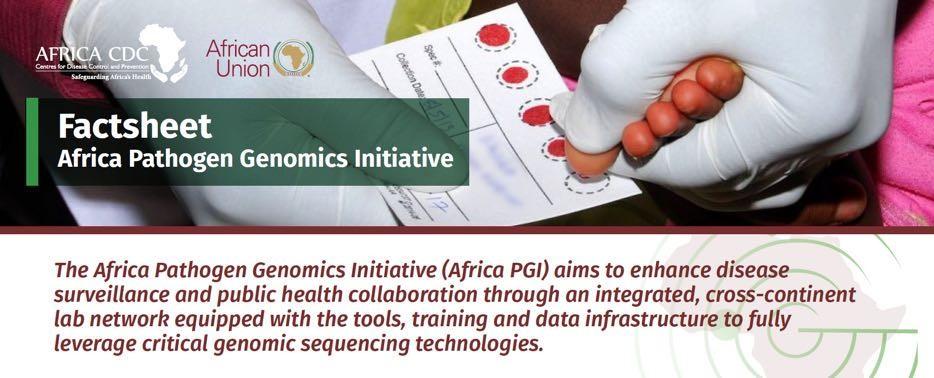
Recently, the centers for disease control and prevention in Africa and the African union commission jointly launched a Pathogen genome project (Pathogen Genomics Initiative, PGI), aims to equipped with tools, training, and data infrastructure across the mainland comprehensive laboratory network, make full use of the genome sequencing of key technology, strengthening Pathogen disease surveillance and public health. The four-year sequencing project has received up to $100 million in funding from organizations including the Bill and Melinda Gates Foundation, Microsoft, Illumina, Oxford Nanopore Technologies and the CENTERS for Disease Control and Prevention.
"A journey of a thousand miles begins with a single step," said John Nkengasong, Head of the African Centre for Disease Control and Prevention, at a webinar to launch the African Pathogen Genome Project. "Today, we are here to celebrate the precious first step, which marks an important turning point in our application of genomics to infectious diseases." The project will be based at the African Centers for Disease Control and Prevention's Institute of Pathogen Genomics, Nkengasong said. Established in 2019, the Institute aims to integrate pathogen genomics and bioinformatics into public health surveillance and outbreak investigation to enhance disease prevention and control.
Amira Mohammed, African Union Commissioner for Social Affairs, said the COVID-19 pandemic has made us aware of the need and importance of strengthening disease surveillance systems and epidemic preparedness in Africa. "The epidemic is a crisis, but we are using it as an opportunity to build health systems in our member states."
The PGI project will begin by expanding the NGS capacity of more than 20 existing public health institutions in Africa, establishing an African-owned database and real-time data-sharing platform to build a network of laboratories in accordance with the regulations of African Union member states, it said. There will also be training programmes, including the establishment of the NGS Academy, to promote international cooperation in the genomics of infectious diseases.

In launching the initiative, David Blazes, an epidemiologist and monitoring expert at the Bill and Melinda Gates Foundation, described the $45m they gave to the non-profit group as a "catalytic investment". This funding will enable the African Centers for Disease Control and Prevention and laboratories to establish NGS and witness the important applications of NGS in pathogen prevention and control. "We discussed the potential of NGS technology to build a national public health laboratory system that can rapidly use NGS to address infectious diseases and to extend the technology to all regions of Africa. Perhaps the only consolation for the COVID-19 pandemic is that it has really generated an interest in public health and technologies that can be used to control outbreaks."

Illumina senior Vice President and Chief Medical Officer, Phil Febbo, said, "The $20 million investment will be used to provide NGS platforms, reagents and training assistance. We will work with the African Centers for Disease Control and Prevention to determine testing coverage, expected fluxes, and optimize other technologies, and help emerging laboratories across Africa have the tools and equipment they need."
Febbo noted that Illumina wants to make sure the cost of the program is not a limiting factor. "Illumina has been working for years to reduce the cost of sequencing. As the program matures, we are confident it will continue to be sustainable through continued cost reductions."

Oxford Nanopore CEO Gordon Sangher says 150 MinIon devices have been deployed in Africa and support customized training programs. He says the Nanopore will also work with local companies to produce and manufacture reagent locally. "We look forward to contributing to the current COVID-19 pandemic. In the long run, hopefully we can continue to train a new generation of scientists and innovators to make it easier for them to access a wide range of DNA information, regardless of cost."
Mark Ihimoyan, Microsoft's Director of Business development for the Middle East and Africa, said the company will provide access to the Microsoft Azure cloud ecosystem to support the sharing of pathogen genome data. In addition, Microsoft will provide technical resources to help design and build the program's data architecture, as well as the integration of bioinformatics software packages on Azure, help build the African Pathogen Genome data repository, and provide training to NGS College.

Greg Armstrong, director of the CENTERS for Disease Control and Prevention's Advanced Molecular Testing Program, stressed the importance of building robust laboratories and public health institutions to work together. Armstrong said the U.S. Centers for Disease Control and Prevention will provide expertise to PGI Africa and expects to provide financial assistance in the near future to bring NGS technology to more low - and middle-income countries.
In recent years, NGs-based pathogen surveillance and public health approaches have been used across Africa to help respond to infectious disease outbreaks involving pathogens such as Ebola, Lassa Fever, yellow fever, malaria and Listeria. Although this technology has great potential in Africa, more than 80 per cent of capacity exists in non-public health institutions, with problems such as lack of relevant policies and guidance, limited capacity in genomics and bioinformatics, insufficient technical staff and limited capacity to use pathogen genomic information for public health decision-making. To address these problems, PGI plans to build a team of outstanding researchers and laboratory scientists in Africa, use NGS to identify new pathogens, monitor epidemic prevention, and build an African-owned database and real-time data sharing platform, ultimately improving the health of people on the continent.

Copyright © 2026 GL events Ruihe (Shanghai) Exhibition Co., Ltd. All Rights Reserved. ( 沪ICP备12004745号-1 )

We deliver the latest IVD news straight to your inbox. Stay in touch with CACLP News.
sign-up for our newsletter today.



To ensure our newsletter hit your inbox, make sure to add @caclp.com to your safe senders list. And, as always, feel free to contact
us with any questions and thanks again for subscribing.
 Go back
Go back
